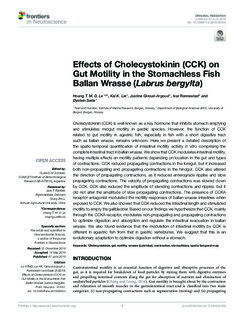| dc.description.abstract | Cholecystokinin (CCK) is well-known as a key hormone that inhibits stomach emptying and stimulates midgut motility in gastric species. However, the function of CCK related to gut motility in agastric fish, especially in fish with a short digestive tract such as ballan wrasse, remains unknown. Here we present a detailed description of the spatio-temporal quantification of intestinal motility activity in vitro comprising the complete intestinal tract in ballan wrasse. We show that CCK modulates intestinal motility, having multiple effects on motility patterns depending on location in the gut and types of contractions. CCK reduced propagating contractions in the foregut, but it increased both non-propagating and propagating contractions in the hindgut. CCK also altered the direction of propagating contractions, as it reduced anterograde ripples and slow propagating contractions. The velocity of propagating contractions was slowed down by CCK. CCK also reduced the amplitude of standing contractions and ripples, but it did not alter the amplitude of slow propagating contractions. The presence of CCKA receptor antagonist modulated the motility responses of ballan wrasse intestines when exposed to CCK. We also showed that CCK reduced the intestinal length and stimulated motility to empty the gallbladder. Based on our findings we hypothesize that CCK, mainly through the CCKA receptor, modulates non-propagating and propagating contractions to optimize digestion and absorption and regulate the intestinal evacuation in ballan wrasse. We also found evidence that the modulation of intestinal motility by CCK is different in agastric fish from that in gastric vertebrates. We suggest that this is an evolutionary adaptation to optimize digestion without a stomach. | nb_NO |
